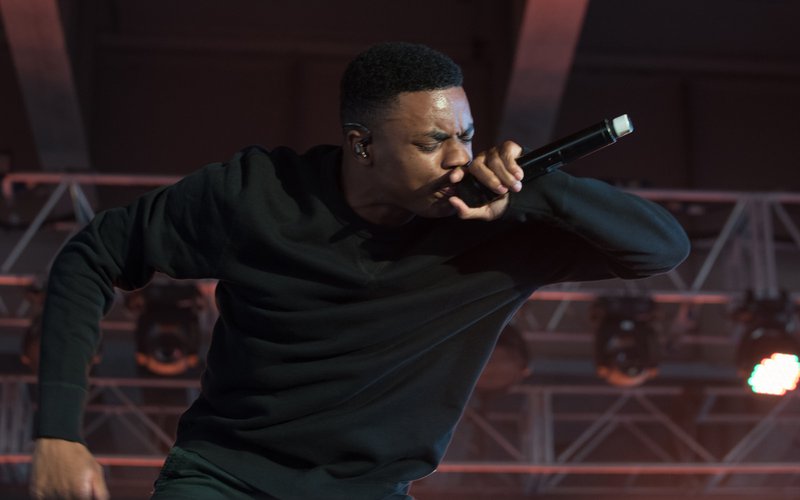
I almost didn't make it into the JPEGMAFIA/Vince Staples show. There was a crowd of hundreds being turned away, literally lined around the block of 9th Avenue. I managed to get in by the grace of whatever high power exists and my delegate badge. I heard the crowd roar as JPEG took the stage, chants of "PEGGY! PEGGY!" as loud as any I've heard for the WWE superstars he frequently references in his tunes. (The "You don't know me" drop which leads or trails behind many of his songs is sampled from the theme song of WWE Hall of Famer Edge.) By the second song in his fairly brief set, he was screaming his lungs out and crowd surfing. The bass kicked my chest in as I stood in the very back of the balcony, in front of the merch table selling $40 vinyl copies of Veteran, my photo pass null and void because photography wasn't allowed during this particular set.
Everything you've heard about the kinetic and infectious energy of Peggy's live sets is alarmingly true.
"I'm high as fuck right now," he admits to unsurprisingly rousing applause and acknowledges the person in charge of the lights beaming bluish bulbs upon this candid moment. He then tore into a thunderous version of "Thug Tears," crooning boisterously and sarcastically quip-rapping about being passive while also rapping about how he'll "make a nigga cry for his dead dad." The clattering percussion and gunshot sounds rang through the Knitting Factory. On the flip-side of the coin, he introduced his corrosive, Kenny Beats-produced single "Puff Daddy" as a means to introduce positivity to his set. There was most definitely a level of glee as he shouted about being strapped like Duke Nukem. The introduction of "I Cannot Fucking Wait 'Til Morrissey Dies" was met with a hero's reception, practically begging for collaboration with Mike Joyce. The drums on "Real Nega" felt like a stampede.
The first six or seven rows (at least) pogo'ed their way through every song, throwing hands up, and chanting "FUCK YOU PEGGY" at the artist's request. Peggy possesses a nearly unholy command of the stage; no hype man, no DJ, hulking around the stage like Henry Rollins in '88, only a little more slender and a lot blacker. At other turns, he was shirtless and caterwauling on the floor like a young Darby Crash. There's a punk-adjacent, confrontational spirit attached to JPEG's music, part and parcel to calling out alt-right denizens in the capital of a state with an alarmingly high white supremacist presence.
Sometimes rap music is used as a Trojan horse to infiltrate white America; on nights like tonight, it is used as a battering ram. There were no closed doors here in the Knitting Factory, as the mostly white crowd went ballistic for "Baby I'm Bleeding," perhaps the song which best distills JPEG's ethos and artistry. Members of the unglued crowd rapped along to every word for the final song of the set, mouthing lyrics about its author storming the White House and swiping "yuppie purses" like Tinder. Here's hoping he keeps his promise to never go blonde like Kanye.
When Vince Staples took the stage to a packed house (some of the fans who were turned away were hanging out on the sidewalk, listening in), a young white woman walked past me wearing a sweatshirt with the phrase "The Juice is Loose" on the back. If you were old enough to be privy to the media blitz of O.J. Simpson's 1994 murder trial (or binged watched the very good miniseries The People vs. O.J. Simpson), it's clear the fascinating subversion of this woman's choice of outfit would be pitch-perfect for a Vince Staples song. The lion's share of his best work grapples with the complex nature of being a black person in America, crouched in trunk-rattling lowrider music and the formally daring bounce of songs like "Yeah Right."
As a matter of full intention, Staples brought out some of his blackest songs for the Boise crowd to sing and rap along to. The bass-heavy lurch of Summertime '06 standout "Lift Me Up" watches clothing store employees following him out of the corner of his eye ("I feel like Mick and Richards, they feel like Muddy Waters"), Uber drivers scared to make drop-offs in front of public housing, and the complications of white fans all-too-eagerly calling back to him when he asks, "Where my niggas at?" (In the immortal words of Paul Mooney, "Everybody wanna be a nigga, but don't nobody want to be a nigga.") "War Ready" carries explicit images of lynching, slave ships, and jail buses.
As the smell of olive juice and weed wafted through the Knitting Factory, fans packed practically into the rafters gyrated their hips to the Long Beach-indebted sounds of "Feels Like Summer." As the music boomed, it became apparent that Staples is a master of introducing subtle messages about race into sterling crowd-pleasers like "FUN!," a song about white panic at the idea of black people congregating to have a good time. Rocking a black t-shirt (also available for $40 at the merch table; commemorative tour tees were $60) and black, slim fit pants, Staples prowled the stage in front of a projection screen made to look like a network of dilapidated surveillance monitors, giving the first few rows of the crowd glimpses of themselves while intermittently cutting to Staples performing. As his current tour with JPEGMAFIA as support is called: smile, you're on camera.
As the cameras placed throughout the venue turned the lens on the crowd itself, Staples sent a powerful message. Black people are surveilled and scrutinized for most of our lives, even — rather, especially — in the throes of joy. Nobody in the Knitting Factory wanted to fuck up anything but were still being watched.
The song is included on the Spider-Man: Into The Spider-Verse soundtrack